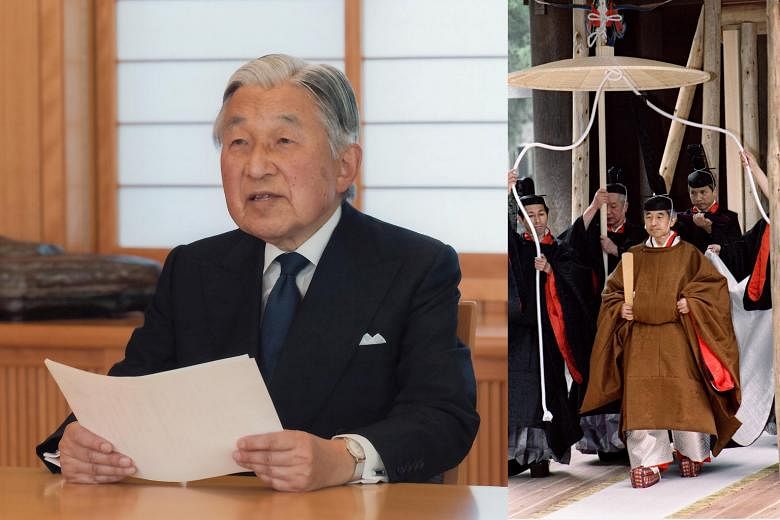In the strongest hint yet that he wants to step down, Japanese Emperor Akihito yesterday confessed in a rare video message his worries over not being able to fulfil his duties as he gets older.
He suggested a regency may be established to act in his place, although this will not change the fact that the Emperor will still hold on to the position until he dies.
"When the Emperor has ill health and his condition becomes serious, I am concerned that, as we have seen in the past, society comes to a standstill and people's lives are impacted in various ways," he said in a 10-minute recorded address that was broadcast nationwide.
-
85.7%
-
Percentage of respondents who said the Imperial House Law should be revised to allow abdication. A total of 1,008 respondents took part in the nationwide telephone survey conducted by the Kyodo news agency earlier this month.
And the death of an emperor has traditionally placed heavy strains on society due to mourning and funeral events that take place simultaneously with the events related to a new era under the Japanese imperial system, he said.
"It occurs to me from time to time to wonder whether it is possible to prevent such a situation."
The 82-year-old revered monarch did not use the words "abdicate" or "step down" in his carefully crafted speech, but said his fitness has been gradually declining.
"I am worried that it may become difficult for me to carry out my duties as the symbol of the State with my whole being as I have done until now," he said, directly addressing millions of Japanese for only the second time in his 28 years of reign.
News reports showed millions watching the address as the nation came to a standstill - from crowded Shinjuku, home to the world's busiest train station, to communities recovering from a deadly earthquake and tsunami five years ago.
It comes a month after local media reported that the Emperor had mooted to his family members and close aides the idea of stepping down if he found himself unable to fully carry out his responsibilities.
He could not speak directly about abdication, as he is bound by the pacifist Constitution not to publicly discuss political matters.
Abdication is deemed a political issue as the Imperial Household Law does not allow a sitting monarch to step down, and would require parliamentary approval for the provisions to be revised.
The Emperor, who was diagnosed with prostate cancer in 2003 and had coronary bypass surgery in 2012, said there have been times when he felt "various constraints" as a result of his physical fitness.
The Imperial Household Agency has been lightening the monarch's workload, but he said it was not possible to "continue reducing perpetually" the Emperor's duties.
He said it is with the "earnest wish" that "the duties of the Emperor as the symbol of the State can continue steadily without a break" that he shared his thoughts.
Prime Minister Shinzo Abe yesterday told a news conference that the government is "thinking about the weight of the Emperor's duties and the strain it may be causing in light of his age. We will carefully consider what to do going forward".
The Yomiuri Shimbun daily quoted sources as saying the government is considering "special legislation" that will allow only the present Emperor to step down and hand over the throne to his elder son, Crown Prince Naruhito, 56.
The report added that a blanket revision of the law might "destabilise" the status of emperors, and that the government wanted to avoid scenarios where an emperor might be forced to step down.
A nationwide telephone survey by the Kyodo news agency this month showed nearly 90 per cent of respondents saying the Emperor is being given too much work. More than 85 per cent said abdication should be made legal.
Japan expert Lam Peng Er of the East Asian Institute said: "I don't think the Abe administration can ignore the desires of Emperor Akihito to plan for a smooth transition for the emperor institution."

